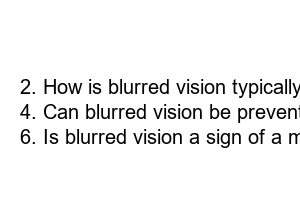시야가 흐려지는 현상
Do you ever find yourself struggling with **blurred vision**? If so, you’re not alone. Blurred vision is a common problem that can affect people of all ages. In this blog post, we’ll explore what causes blurred vision, how it can be treated, and when you should seek medical help.
**What is Blurred Vision?**
Blurred vision is a condition in which objects appear out of focus or hazy. It can be caused by a number of factors, including refractive errors, eye strain, or underlying health conditions.
**Common Causes of Blurred Vision**
Refractive errors, such as nearsightedness, farsightedness, or astigmatism, can all cause blurred vision. Additionally, conditions like dry eye syndrome, glaucoma, or cataracts can also lead to blurry vision.
**Symptoms of Blurred Vision**
If you’re experiencing blurred vision, you may also notice other symptoms such as eye pain, headaches, or difficulty seeing at night. It’s important to pay attention to these symptoms and seek medical help if they persist.
**Treatment Options for Blurred Vision**
The treatment for blurred vision will depend on the underlying cause of the problem. In some cases, simply wearing prescription glasses or contact lenses can improve your vision. Other treatment options may include eye drops, medications, or surgery.
**When to See a Doctor**
If you’re experiencing persistent blurred vision or if your symptoms are affecting your daily life, it’s important to see an eye doctor. They can conduct a comprehensive eye exam to determine the cause of your blurred vision and recommend the appropriate treatment.
**Preventing Blurred Vision**
To help prevent blurred vision, it’s important to take care of your eyes by wearing protective eyewear, taking regular breaks from screens, and getting regular eye exams. Maintaining a healthy lifestyle, including a balanced diet and regular exercise, can also help keep your eyes healthy.
**Summary**
Blurred vision can be a frustrating and uncomfortable problem, but it’s important to remember that there are treatment options available. By understanding the causes of blurred vision and knowing when to seek medical help, you can take control of your eye health and improve your vision. Don’t hesitate to reach out to an eye care professional if you’re experiencing persistent symptoms of blurred vision.
**FAQs**
1. What are the common causes of blurred vision?
2. How is blurred vision typically treated?
3. When should I see a doctor for blurred vision?
4. Can blurred vision be prevented?
5. Are there any lifestyle changes that can improve blurred vision?
6. Is blurred vision a sign of a more serious eye condition?

